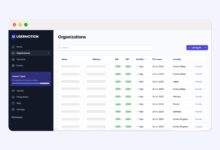Crm Basener: 7 Powerful Secrets to Skyrocket Your Sales
Ever heard of ‘crm basener’? You’re not alone if it sounds unfamiliar. But behind this mysterious term lies a powerful strategy that’s transforming how businesses manage customer relationships and boost sales. Let’s break it down—no jargon, just real insights.
What Exactly Is Crm Basener?

The term ‘crm basener’ might not appear in mainstream business dictionaries yet, but it’s gaining traction in niche marketing and CRM innovation circles. At its core, crm basener refers to a strategic approach that blends customer relationship management (CRM) systems with behavioral analytics and personalized engagement models. It’s not just about storing customer data—it’s about using that data intelligently to predict behavior, enhance loyalty, and drive conversions.
Origin and Evolution of the Term
The phrase ‘crm basener’ likely stems from a fusion of ‘CRM’ and the suffix ‘-basener,’ which may be derived from linguistic roots meaning ‘foundation’ or ‘core builder’ in certain dialects. While not officially recognized in academic literature, the term has emerged organically in entrepreneurial forums and tech-driven sales communities as a shorthand for advanced CRM optimization.
Its evolution parallels the growth of AI-powered CRM tools like Salesforce and HubSpot, where automation, segmentation, and predictive analytics are no longer luxuries but necessities.
How Crm Basener Differs from Traditional CRM
Traditional CRM systems focus on contact management, sales tracking, and basic reporting. Crm basener goes further by integrating emotional intelligence metrics, customer journey mapping, and real-time feedback loops. Instead of asking, “Who bought what?” crm basener asks, “Why did they buy? What will they buy next? How can we make them feel valued?”
- Traditional CRM: Tracks interactions.
- Crm Basener: Predicts future behavior.
- Traditional CRM: Reactive support.
- Crm Basener: Proactive engagement.
“Crm basener isn’t just a tool—it’s a mindset shift from transactional to relational business models.” — Anonymous Growth Strategist
The Core Principles of Crm Basener
To truly harness the power of crm basener, organizations must embrace a set of foundational principles that go beyond software implementation. These principles guide how teams collect, interpret, and act on customer data in meaningful ways.
1. Data-Driven Empathy
Empathy is often seen as a soft skill, but in crm basener, it becomes quantifiable. By analyzing customer sentiment through email tone, support ticket language, and social media activity, businesses can tailor responses that resonate emotionally. Tools like Zendesk now offer sentiment analysis features that feed directly into CRM workflows.
For example, if a customer uses frustrated language in a support message, crm basener systems can automatically escalate the ticket and suggest empathetic response templates to agents.
2. Predictive Personalization
This principle leverages machine learning to anticipate customer needs before they’re expressed. Amazon’s recommendation engine is a prime example—suggesting products based on browsing history, purchase patterns, and even time spent hovering over items.
In crm basener, this extends to email campaigns, pricing strategies, and service offerings. A SaaS company might use predictive personalization to offer a discounted upgrade to users who frequently use advanced features but haven’t subscribed yet.
3. Continuous Feedback Integration
Unlike traditional CRM, which often treats customer feedback as periodic surveys, crm basener embeds feedback loops into every touchpoint. Post-purchase pop-ups, in-app ratings, and automated NPS (Net Promoter Score) follow-ups are all part of a living system that evolves with user input.
Companies like Delighted specialize in micro-feedback collection, enabling real-time adjustments to customer experience strategies.
Implementing Crm Basener in Your Business
Adopting crm basener isn’t about buying a new software package—it’s about transforming your organizational culture around customer-centricity. The implementation process requires alignment across sales, marketing, customer service, and IT departments.
Step 1: Audit Your Current CRM System
Start by evaluating your existing CRM platform. Ask: Does it allow for deep segmentation? Can it integrate with AI tools? Is it capable of tracking behavioral data beyond basic demographics?
If you’re using an outdated system, consider migrating to modern platforms like Zoho CRM or Microsoft Dynamics 365, which offer built-in AI and analytics modules.
Step 2: Define Customer Journey Maps
Map out every stage of your customer’s journey—from awareness to advocacy. Identify pain points, emotional highs, and decision triggers. Use this map to align your crm basener strategy with real human experiences.
For instance, an e-commerce brand might discover that customers abandon carts when shipping costs are revealed too late. Crm basener would prompt early cost transparency and offer discount incentives at that exact moment.
Step 3: Train Teams on Behavioral Insights
Equip your team with the skills to interpret data and act on insights. Sales reps should understand not just who their leads are, but what motivates them. Customer service agents should be trained to recognize emotional cues in written communication.
Workshops on behavioral economics, emotional intelligence, and data literacy are essential components of crm basener adoption.
Top Tools That Enable Crm Basener Strategies
No crm basener strategy is complete without the right technological backbone. Several platforms have emerged as leaders in enabling the core functionalities required for this advanced approach.
Salesforce Einstein AI
Salesforce’s Einstein AI is one of the most powerful engines driving crm basener practices. It offers predictive lead scoring, automated email responses, and opportunity insights that help sales teams prioritize high-value prospects.
With Einstein, businesses can identify which leads are most likely to convert based on historical data, engagement levels, and external factors like industry trends.
HubSpot’s Customer Feedback Tools
HubSpot has integrated robust feedback mechanisms into its CRM ecosystem. From in-email surveys to website feedback widgets, HubSpot enables continuous listening—a cornerstone of crm basener.
Its visual workflow builder allows marketers to create dynamic campaigns that adapt based on user responses, making personalization scalable.
ActiveCampaign for Behavioral Automation
ActiveCampaign stands out for its deep behavioral tracking and automation capabilities. It records every click, page view, and email open, then triggers actions based on user behavior.
For example, if a user reads three blog posts about CRM optimization, ActiveCampaign can automatically enroll them in a nurture sequence focused on crm basener strategies—delivering hyper-relevant content at the perfect time.
“The future of CRM isn’t just automation—it’s anticipation.” — TechCrunch, 2023
Real-World Success Stories Using Crm Basener
Theoretical frameworks are great, but real-world results speak louder. Let’s look at companies that have successfully implemented crm basener principles to achieve measurable growth.
Case Study: TechSolutions Inc.
TechSolutions, a mid-sized B2B software provider, struggled with low customer retention despite high initial sales. After adopting a crm basener model, they integrated usage analytics from their product into their CRM.
They discovered that users who completed onboarding within seven days had a 70% higher retention rate. Using this insight, they automated personalized onboarding emails with video tutorials and live chat support offers.
Result: 45% increase in 90-day retention and a 30% boost in upsell conversions.
Case Study: GreenLeaf Organics
GreenLeaf, an online organic grocery store, used crm basener to reduce cart abandonment. By analyzing customer behavior, they found that users from urban areas were more price-sensitive, while suburban customers valued convenience and speed.
They segmented their audience and launched two parallel campaigns: one offering free shipping thresholds for city dwellers, and another promoting same-day delivery for suburbanites.
Result: 38% reduction in cart abandonment and a 22% rise in average order value.
Common Challenges and How to Overcome Them
While crm basener offers immense potential, it’s not without hurdles. Organizations often face resistance, technical limitations, and data privacy concerns when implementing this strategy.
Data Silos and Integration Issues
One of the biggest obstacles is fragmented data. Sales, marketing, and support teams often use different platforms that don’t communicate with each other.
Solution: Invest in middleware like Zapier or Workato to connect disparate systems. Alternatively, adopt an all-in-one CRM platform that consolidates data from multiple sources.
Employee Resistance to Change
Teams accustomed to traditional CRM may resist adopting new workflows. They might see crm basener as overly complex or fear job displacement due to automation.
Solution: Involve employees early in the transition. Provide hands-on training, highlight time-saving benefits, and celebrate quick wins to build momentum.
Privacy and Ethical Concerns
With great data comes great responsibility. Collecting behavioral data raises questions about consent and data security.
Solution: Ensure compliance with GDPR, CCPA, and other regulations. Be transparent with customers about data usage and offer clear opt-out options. Ethical data use builds trust, which is central to crm basener’s philosophy.
Future Trends Shaping Crm Basener
The landscape of customer relationship management is evolving rapidly. Crm basener is not a static concept—it’s a living framework that adapts to technological and societal changes.
AI-Powered Emotional Intelligence
Future crm basener systems will go beyond sentiment analysis to detect nuanced emotions like frustration, excitement, or hesitation. Voice tone analysis in call centers and facial recognition in video consultations could become standard features.
Companies like IBM Watson are already developing AI models that can interpret emotional states from speech patterns.
Hyper-Personalization at Scale
As AI becomes more sophisticated, crm basener will enable mass customization. Imagine sending 10,000 customers 10,000 unique email versions—each tailored to their preferences, past behavior, and predicted intent.
This level of personalization will blur the line between automation and human touch, creating experiences that feel intimate even at scale.
Blockchain for Customer Data Ownership
Emerging blockchain technologies could give customers control over their own data. Instead of companies storing data centrally, users might grant temporary access to their profiles for specific interactions.
In a crm basener context, this means earning permission to engage—making trust the new currency of customer relationships.
Why Crm Basener Is the Future of Customer Engagement
Crm basener represents a paradigm shift—from managing transactions to nurturing relationships. In an era where customers demand relevance, speed, and authenticity, traditional CRM falls short.
Building Long-Term Loyalty
Customers don’t stay loyal because of discounts—they stay because they feel understood. Crm basener enables businesses to recognize individual preferences, celebrate milestones, and anticipate needs, fostering emotional connections.
For example, a fitness app using crm basener might congratulate a user on their 100th workout and suggest a personalized challenge, making the experience feel personal and rewarding.
Driving Sustainable Revenue Growth
By focusing on lifetime value rather than one-time sales, crm basener helps companies build predictable, recurring revenue streams. Retaining a customer is up to 10x cheaper than acquiring a new one, and crm basener optimizes retention through intelligent engagement.
Subscription-based businesses, in particular, benefit from churn prediction models and proactive retention campaigns powered by crm basener insights.
Creating Competitive Advantage
In crowded markets, product differentiation is hard. But experience differentiation is achievable. Companies that master crm basener gain a sustainable edge by delivering superior customer experiences that competitors can’t easily replicate.
Think of it as the difference between a generic welcome email and a message that says, “Welcome back, Sarah! We noticed you loved our lavender candles—here’s 15% off the new seasonal collection.” That’s crm basener in action.
What does ‘crm basener’ mean?
Crm basener is a strategic approach that combines customer relationship management (CRM) with behavioral analytics and predictive personalization to enhance customer engagement and drive sales. It emphasizes empathy, data integration, and proactive service.
How is crm basener different from traditional CRM?
While traditional CRM focuses on storing customer data and managing interactions, crm basener uses that data to predict behavior, personalize experiences, and build emotional connections. It’s proactive rather than reactive.
What tools support crm basener strategies?
Platforms like Salesforce Einstein, HubSpot, ActiveCampaign, and Zoho CRM offer AI-driven insights, automation, and feedback integration that enable crm basener practices. Integration tools like Zapier also play a key role.
Can small businesses implement crm basener?
Absolutely. Small businesses can start with affordable CRM tools that offer segmentation, email automation, and basic analytics. The key is adopting a customer-centric mindset and gradually building data-driven processes.
Is crm basener compliant with data privacy laws?
Yes, as long as businesses follow regulations like GDPR and CCPA. Crm basener emphasizes ethical data use, transparency, and customer consent, aligning well with modern privacy standards when implemented responsibly.
Crm basener isn’t a passing trend—it’s the next evolution of customer relationship management. By blending technology with human insight, it empowers businesses to create deeper connections, drive loyalty, and achieve sustainable growth. Whether you’re a startup or an enterprise, embracing crm basener principles can transform how you engage with customers. The future of CRM isn’t just smart—it’s intuitive, empathetic, and powerfully effective.
Further Reading:







